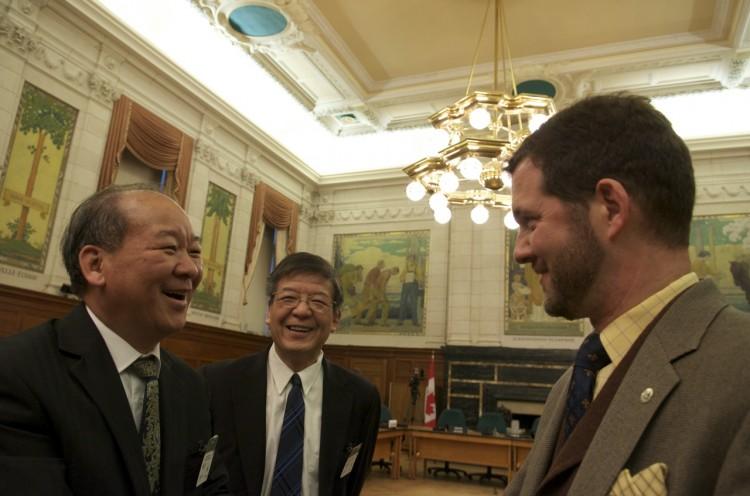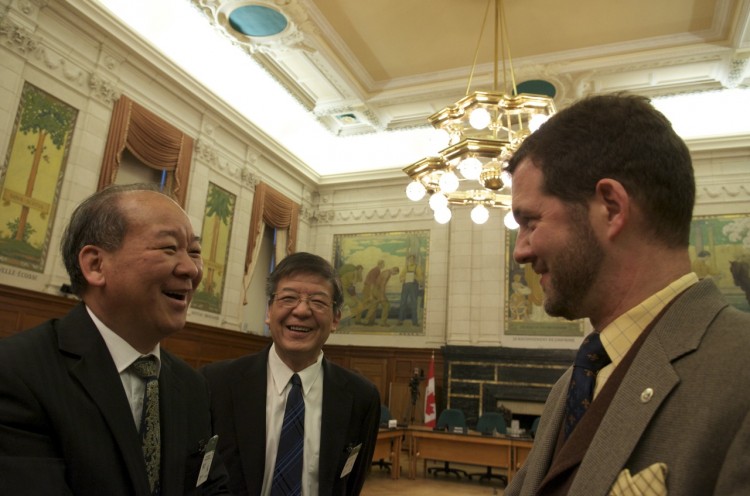PARLIAMENT HILL, Ottawa—Mingli Lin paused midway through his testimony, his quiet sob just audible in the silence of the committee chamber.
It was a horrific tale, made worse by how easily it could have been avoided. In a comforting gesture, Tory MP Nina Grewal brought him a glass of water. After a moment, he continued.
Just before Immigration Minister Jason Kenney granted Lin a rare special visa to come to Canada, he'd spent the previous five years in a Chinese prison.
Physical beatings and forced labour from early morning till late night were only part of what he suffered. Hundreds of thousands are suffering similarly now, he told Parliament’s Subcommittee On International Human Rights Thursday afternoon.
Mingli started practicing in Falun Gong in 1997, getting a new lease on life as his illnesses melted away. Then two years later the practice was outlawed by the Chinese regime, and after being kidnapped four times over the years, he was sentenced to six years in 2005.
Mingli literally rotted in prison; festering wounds on his buttocks would leave flesh on his makeshift bandages. The wounds were from being forced to sit on a hard stool for hours at a time.
“If I moved, they would kick me, kick my face, kick my head. All my teeth were kicked out, as a result I had to change my teeth,” he recalled.
He was beaten with bamboo, stripped and forced to sit on cold concrete while cold water was poured over him, and a tube used to force-feed him became a torture instrument that punctured him internally, leading to internal bleeding for which he was hospitalized.
If not for international pressure for his release, Mingli said he would not have been hospitalized.
“This is only a part of the suffering. Because they wanted me to write a repentance letter, I refused. Two people would grab my feet and they would swing me against the wall, use boiling water and pour it on my face. In Chinese prisons, Falun Gong practitioners suffered enormously, you can’t even imagine,” he said.
Mingli was told to renounce Falun Gong, a traditional Chinese meditation practice that adherents say heals them physically and leads them to hold themselves to higher moral standards with its central tenet: truthfulness, compassion, and tolerance.
In prison, a workday could last from 5 a.m. until midnight if targets were not reached, said Mingli. His fingers blistered and pealed from sewing baseballs.
He saw another Falun Gong practitioner beaten with plastic shoes until his head was “battered to pieces.” When the practitioner asked his assailants “Do you understand truthfulness, compassion, and tolerance,” they threw him down four floors.
“In prison, you often heard screams coming from Falun Gong practitioners who were being tortured,” he recalled.
Beside Mingli on Thursday was his younger brother Shenli Lin, also an adherent of Falun Gong, who was also rescued from the looming threat of torture and death with the help of the Canadian government. Liberal MP Irwin Cotler played a significant role in his release, acting as Shenli’s pro-bono lawyer.
But while Shenli spent only two years in prison, Mingli suffered five more, all because the Shanghai Consulate denied him a visa despite a House of Commons unanimous motion calling for Mingli to be brought to Canada.
It was a frustrating experience for Scott Reid, who chairs the Subcommittee on International Human Rights that heard the brothers testimony on Thursday.
Reid railed about the issue all those years ago, sometimes shouting in frustration, he said. Reid found it difficult to listen as Mingli recalled what happened when the unexplained visa refusal left him waiting in China until the regime rearrested him and imprisoned him once again.
Both brothers had been detained, but after Shenli was released, he was rescued to Canada in 2002 with the help of his wife, Jinyu, a Canadian citizen.
She wrote 300 letters to officials, sat 24 hours a day for two weeks in front of the Chinese embassy in Ottawa, went on a five-day hunger strike, and walked 4000 kilometres across Canada to draw attention to her husband’s imprisonment.
But Mingli was never given a visa. It took high-level help from Citizenship and Immigration Canada, likely Kenney himself, to get Mingli out of the country after his more recent detention.
Both brothers said it was important Canadian officials speak publicly against the regime’s ongoing abuses, noting that international pressure made a major difference in their own incarcerations.
Mingli thought he would not have been hospitalized if not for the international attention drawn to his case, while Shenli expected his incarceration would have been much more severe had Canadian MPs like Reid and Irwin Cotler not taken up his case.







